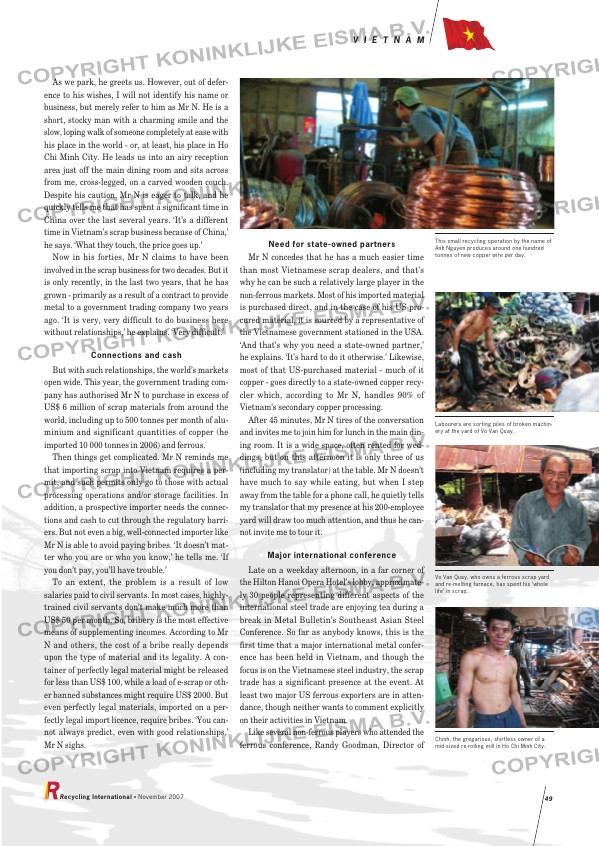Page 49 from: November 2007

As we park, he greets us. However, out of defer-
ence to his wishes, I will not identify his name or
business, but merely refer to him as Mr N. He is a
short, stocky man with a charming smile and the
slow, loping walk of someone completely at ease with
his place in the world – or, at least, his place in Ho
Chi Minh City. He leads us into an airy reception
area just off the main dining room and sits across
from me, cross-legged, on a carved wooden couch.
Despite his caution, Mr N is eager to talk, and he
quickly tells me that has spent a significant time in
China over the last several years. ‘It’s a different
time in Vietnam’s scrap business because of China,’
he says. ‘What they touch, the price goes up.’
Now in his forties, Mr N claims to have been
involved in the scrap business for two decades. But it
is only recently, in the last two years, that he has
grown – primarily as a result of a contract to provide
metal to a government trading company two years
ago. ‘It is very, very difficult to do business here
without relationships,’ he explains. ‘Very difficult.’
Connections and cash
But with such relationships, the world’s markets
open wide. This year, the government trading com-
pany has authorised Mr N to purchase in excess of
US$ 6 million of scrap materials from around the
world, including up to 500 tonnes per month of alu-
minium and significant quantities of copper (he
imported 10 000 tonnes in 2006) and ferrous.
Then things get complicated. Mr N reminds me
that importing scrap into Vietnam requires a per-
mit, and such permits only go to those with actual
processing operations and/or storage facilities. In
addition, a prospective importer needs the connec-
tions and cash to cut through the regulatory barri-
ers. But not even a big, well-connected importer like
Mr N is able to avoid paying bribes. ‘It doesn’t mat-
ter who you are or who you know,’ he tells me. ‘If
you don’t pay, you’ll have trouble.’
To an extent, the problem is a result of low
salaries paid to civil servants. In most cases, highly-
trained civil servants don’t make much more than
US$ 50 per month. So, bribery is the most effective
means of supplementing incomes. According to Mr
N and others, the cost of a bribe really depends
upon the type of material and its legality. A con-
tainer of perfectly legal material might be released
for less than US$ 100, while a load of e-scrap or oth-
er banned substances might require US$ 2000. But
even perfectly legal materials, imported on a per-
fectly legal import licence, require bribes. ‘You can-
not always predict, even with good relationships,’
Mr N sighs.
Need for state-owned partners
Mr N concedes that he has a much easier time
than most Vietnamese scrap dealers, and that’s
why he can be such a relatively large player in the
non-ferrous markets. Most of his imported material
is purchased direct, and in the case of his US-pro-
cured material, it is sourced by a representative of
the Vietnamese government stationed in the USA.
‘And that’s why you need a state-owned partner,’
he explains. ‘It’s hard to do it otherwise.’ Likewise,
most of that US-purchased material – much of it
copper – goes directly to a state-owned copper recy-
cler which, according to Mr N, handles 90% of
Vietnam’s secondary copper processing.
After 45 minutes, Mr N tires of the conversation
and invites me to join him for lunch in the main din-
ing room. It is a wide space, often rented for wed-
dings, but on this afternoon it is only three of us
(including my translator) at the table. Mr N doesn’t
have much to say while eating, but when I step
away from the table for a phone call, he quietly tells
my translator that my presence at his 200-employee
yard will draw too much attention, and thus he can-
not invite me to tour it.
Major international conference
Late on a weekday afternoon, in a far corner of
the Hilton Hanoi Opera Hotel’s lobby, approximate-
ly 30 people representing different aspects of the
international steel trade are enjoying tea during a
break in Metal Bulletin’s Southeast Asian Steel
Conference. So far as anybody knows, this is the
first time that a major international metal confer-
ence has been held in Vietnam, and though the
focus is on the Vietnamese steel industry, the scrap
trade has a significant presence at the event. At
least two major US ferrous exporters are in atten-
dance, though neither wants to comment explicitly
on their activities in Vietnam.
Like several non-ferrous players who attended the
ferrous conference, Randy Goodman, Director of
V I E T N A M
Recycling International • November 2007 49
This small recycling operation by the name of
Anh Nguyen produces around one hundred
tonnes of new copper wire per day.
Chinh, the gregarious, shirtless owner of a
mid-sized re-rolling mill in Ho Chi Minh City.
Vo Van Quay, who owns a ferrous scrap yard
and re-melting furnace, has spent his ‘whole
life’ in scrap.
Labourers are sorting piles of broken machin-
ery at the yard of Vo Van Quay.
RI_008 Vietnam:Opmaak 1 08-11-2007 09:47 Pagina 49



